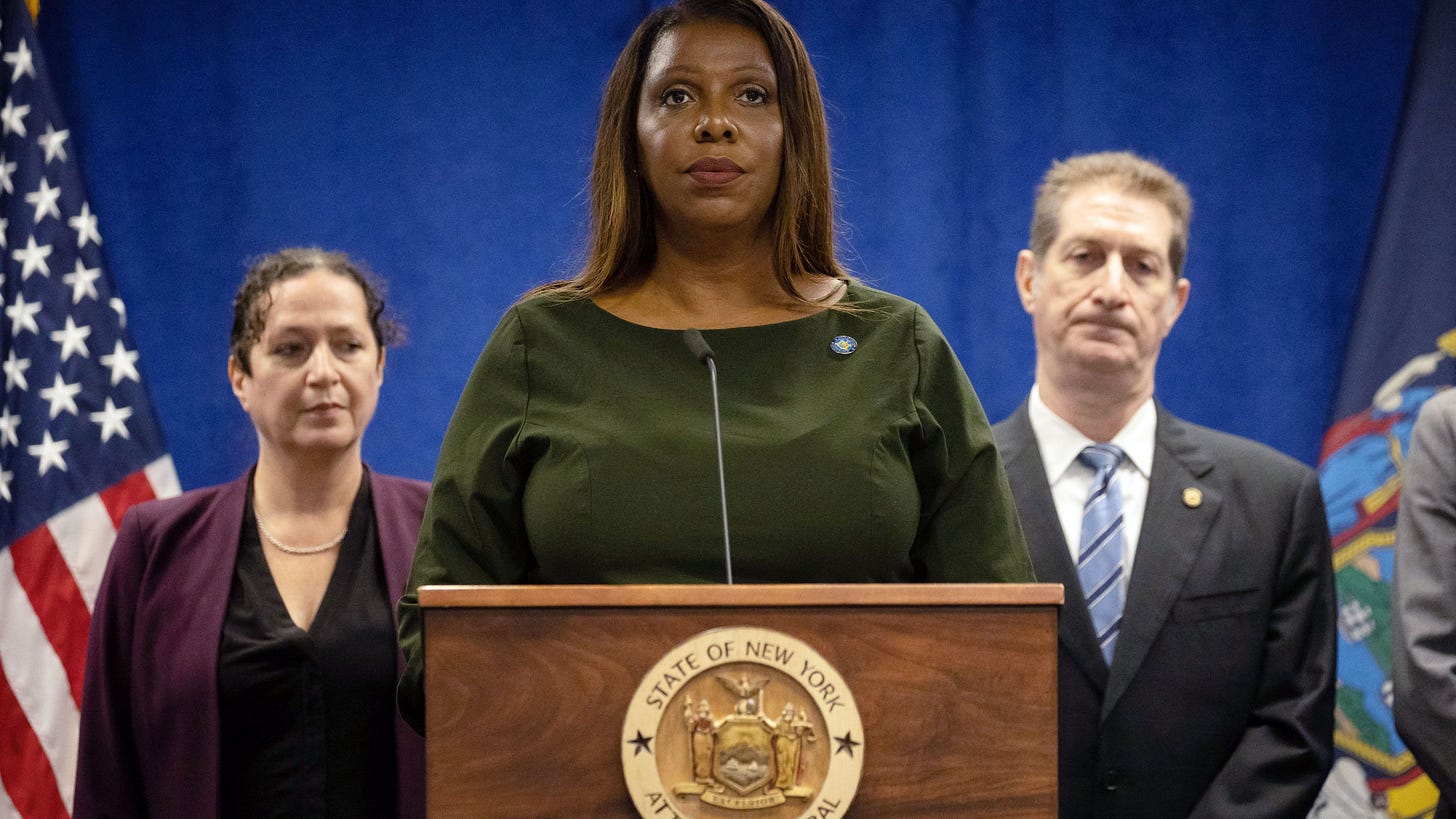When Environmental Law Becomes Anti-Beef: Letitia James’ JBS Case Misses the Mark
New York Attorney General Letitia James sued meat-packing giant JBS USA for what she called “false and misleading environmental claims.”
In February 2024, New York Attorney General Letitia James sued meat-packing giant JBS USA for what she called “false and misleading environmental claims.” The company had advertised a bold goal—Net Zero by 2040—yet, according to James, lacked any credible plan to get there. By November 2025, that case ended in a $1.1 million settlement earmarked for New York “climate-smart agriculture” programs and a three-year requirement that JBS submit compliance reports.
But dig a little deeper and the optics are troubling. James’ own complaint didn’t merely say JBS exaggerated its progress—it claimed the goal itself was impossible because the company was expanding beef production and relied on ranchers who raise cattle. In essence, she argued that because beef comes from cows—and cows emit methane—JBS could never credibly reach net-zero emissions while remaining a beef company.
That’s an extraordinary legal stretch. The lawsuit wasn’t about a present fraud or a broken promise; it was about the belief that future meat production is inherently incompatible with climate goals. The court ultimately dismissed the case without prejudice in January 2025 for technical reasons, and the later “Assurance of Discontinuance” was an administrative settlement—no admission of guilt, no proven violation. Legally, James didn’t win; she leveraged public pressure to secure a headline and a check.
The Legal Theory: Present Deception or Future Thought Crime?
Under New York’s General Business Law §§ 349–350, a company can be punished for deceptive marketing if it makes claims that are materially misleading at the time they’re made. James framed JBS’s 2040 pledge as deceptive in 2024 because the company hadn’t quantified its full emissions, had no science-based pathway, and was still building plants. Yet that logic veers into speculative territory. It treats aspiration as deception, and that precedent could chill any corporation from setting public environmental goals at all.
You can dislike the big packers—and many ranchers do—but suing a company because it still processes cattle seems more like policy activism than consumer protection. It paints the very act of working with American ranchers as an environmental sin.
Collateral Damage: Consumers and Ranchers
These climate lawsuits don’t hurt corporate boards; they ripple down to the people who actually feed us. Beef prices remain at historic highs, driven by inflation, tight supply, and increased regulation. Every legal hit to a major processor adds compliance costs, which the market ultimately passes to consumers and ranchers alike.
If JBS or Tyson trims production to appease regulators, cattle demand contracts. Independent ranchers—who already struggle with thin margins and volatile feed costs—take the loss first. And when prices rise on the grocery shelf, it’s not the CEO or the attorney general who pays the tab.
Climate Optics and the Gates Factor
Even Bill Gates, one of the world’s most vocal climate philanthropists, recently admitted that climate change, while serious, is “not the end of the world.” He’s called for realism over panic, acknowledging that technological adaptation and land-use efficiency are part of the solution. That nuance is missing from the courtroom version of climate policy.
By implying that any company expanding beef output is deceiving the public, James effectively criminalizes food production itself. It’s a worldview in which ranching must shrink to save the planet—a narrative that ignores centuries of rangeland stewardship and emerging methane-reduction technologies within the beef industry.
Did James Actually Win?
No. The case was dismissed. The later settlement was voluntary and administrative, not judicial. The $1.1 million payout bought peace, not defeat. And while James claimed victory, the underlying legal question—whether a 2040 sustainability goal can be “false” in 2024—remains unresolved.
What she achieved was a precedent of perception: that a prosecutor can brand aspirational climate marketing as a consumer-fraud issue, even when no consumer loss is proven. That’s a dangerous expansion of authority that reaches well beyond JBS.
This isn’t about JBS… nobody likes them.
You don’t have to love JBS to see the warning sign here. If a state attorney general can sue a company for planning to keep feeding people, imagine how quickly that logic can be turned on dairy co-ops, grain growers, or even small-scale ranches marketing “sustainable beef.”
The irony? The same office that claims to defend climate-smart agriculture just took a shot at the very producers whose livelihoods depend on it.
Corporate accountability matters. So does truth in advertising. But when environmental law becomes a tool to punish the idea of producing food, it stops serving consumers and starts serving ideology. Whether you like JBS or not, Letitia James’ crusade says more about the politics of optics than the pursuit of justice—and it risks turning America’s ranchers into collateral damage in a legal war over belief.




